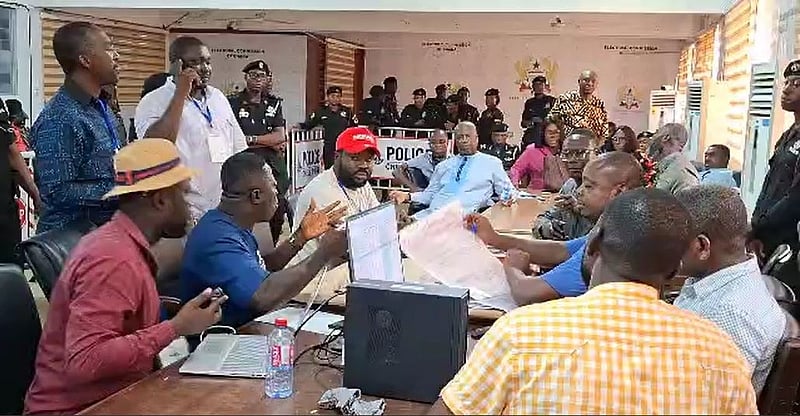The Ablekuma North Constituency parliamentary election has become a focal point of contention, with agents of the National Democratic Congress (NDC) vehemently demanding a re-run of the polls. Their demand stems from deep-seated concerns regarding the authenticity of certain Statements of Results, commonly known as pink sheets, used in the collation process for the December 7th parliamentary elections. The NDC agents argue that these pink sheets are invalid and should not be considered in the final tally, thereby casting doubt on the integrity of the entire electoral process in the constituency. They have firmly rejected any alternative resolution, emphasizing that only a fresh election can address their concerns and guarantee a fair and credible outcome. This unwavering stance reflects the seriousness of their allegations and underscores their commitment to upholding the principles of transparent and accountable elections.
The heart of the dispute lies in the conflicting perspectives between the NDC agents and the Returning Officer, Mr. Vincent Obeng. Despite the NDC’s persistent objections and their detailed arguments challenging the validity of the disputed pink sheets, Mr. Obeng overruled their concerns. He maintained that the pink sheets in question were indeed valid and admissible for collation, a decision that ignited a heated exchange at the collation center. The clash highlights the high stakes involved in this electoral contest and the deep-seated mistrust between the NDC and the electoral authorities. The NDC’s insistence on a re-run suggests a lack of confidence in the impartiality of the Returning Officer and a belief that the existing process cannot guarantee a fair outcome.
Adding another layer of complexity to the situation is the intervention of Gladys Pinkrah, the Greater Accra Regional Director of the Electoral Commission (EC). She clarified that the authority to call for a re-run of the parliamentary election rests solely with the Electoral Commission itself, not with individual officials like the Returning Officer. This statement emphasizes the hierarchical structure of the EC and the established procedures for handling such disputes. It also suggests that the NDC’s demands will need to be formally addressed by the Commission, rather than being resolved at the constituency level. This clarifies the pathway for the NDC to pursue their grievances, but also introduces another potential delay in resolving the impasse.
Meanwhile, Mr. Evans Nimako, Director of Elections for the New Patriotic Party (NPP), has appealed for calm and cooperation. He urged all stakeholders to work with the Electoral Commission to ensure the smooth completion of the re-collation exercise. This call for collaboration contrasts with the escalating tensions between the NDC and the electoral authorities. It reflects the NPP’s interest in a swift and conclusive resolution to the dispute, perhaps to avoid further disruptions or challenges to the legitimacy of the election results. Mr. Nimako’s appeal underscores the broader political implications of the situation and the potential for further polarization if the dispute remains unresolved.
The Ablekuma North Constituency election highlights the critical role of transparent and credible electoral processes in maintaining public trust in democratic governance. The NDC’s concerns about the validity of the pink sheets underscore the importance of meticulous record-keeping and adherence to established procedures. The clash between the NDC agents and the Returning Officer reveals the potential for disputes to arise even within seemingly well-defined frameworks. The intervention of the Regional Director of the EC and the appeal from the NPP Director of Elections demonstrate the complex interplay of various actors in navigating electoral disputes.
The ultimate outcome of this situation will have significant implications for both the Ablekuma North Constituency and the broader Ghanaian political landscape. A re-run of the election, if granted by the EC, would represent a substantial undertaking, requiring significant resources and potentially delaying the formation of the constituency’s representation in parliament. Alternatively, if the NDC’s demands are not met, it could lead to further legal challenges and deepen the existing mistrust in the electoral process. The situation in Ablekuma North therefore serves as a crucial test of Ghana’s electoral system and its capacity to address disputes fairly and efficiently. It underscores the importance of continuous efforts to strengthen electoral integrity and foster confidence in the democratic process.














